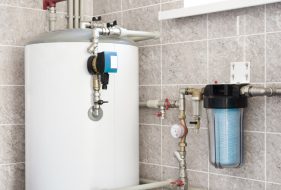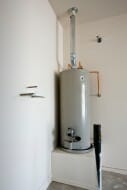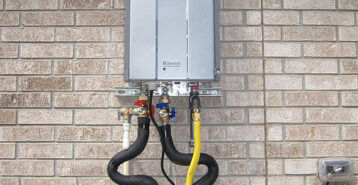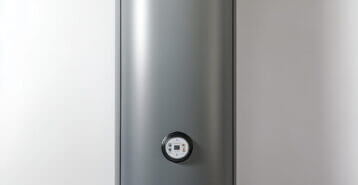Understanding the Cost of Replacing a Gas Water Heater
The cost to replace a gas water heater will vary depending on a few factors. Water heater type, size and capacity, fuel type, location, and local labor rates affect project costs. Any additional plumbing or electrical work you may require to accommodate the new water heater, or if it must be relocated, will also impact installation costs.
How Much Does It Cost to Replace a Gas Water Heater?
The average cost to replace a gas water heater is $1,000 to $6,000. Labor typically accounts for nearly 50% of the project, ranging from $500 for basic models up to $2,500 for tankless or hybrid water heaters.
Factors Affecting Water Heater Replacement Costs
Gas water heater replacement costs vary depending on the model you purchase and your specific installation requirements. Here are the main factors to consider when choosing a new gas water heater.
Water Heater Type
There are several different types of gas water heaters, and each comes with its own pros and cons.
- Tank water heaters are the most common and use natural gas or propane to operate.
- Tankless water heaters provide hot water on demand and require a higher upfront cost.
- Condensing gas water heaters and hybrid water heaters are more energy-efficient than tank-style heaters and also cost more on average compared to traditional tank models.
Water Heater Size or Capacity
The size of the water heater or its capacity can also affect the unit cost. Gas water heater capacity is measured by its tank size, and 30 to 80 gallons are the most common in homes. Tankless water heater capacity is measured by its flow rate or gallons per minute (GPM), with four to 12 GPM a common range for most households. The higher the tank size or GPM, the higher the cost on average for both the unit and installation.
Energy Efficiency
Hybrid or heat pump water heaters are more energy efficient than tank and tankless models because they harness heat from exhaust gasses and surrounding air to operate. These energy-efficient models can cost 25 percent or more on average, however they offer long-term energy cost savings.
Specific ENERGY STAR gas water heaters qualify for the Energy Efficient Home Improvement Credit. Qualified installations between January 2023 to 2032 are eligible for a tax credit of 30% of the project cost up to $600.
Labor and Material Costs
The cost to install a gas water heater will vary depending on the type of water heater and labor rates in your area. On average, homeowners can expect to pay $500 to $2,500 for labor and $500 to $3,500 for materials. Gas tank water heaters typically cost less to install than tankless models. Tankless water heaters require more complex work, such as new venting, gas line upgrades, and electrical modifications to accommodate the system.
Water Heater Location
Installing a water heater in a garage or utility space will cost less than in a harder-to-reach area like an attic or basement. The more difficult it is for a contractor to reach, the more expensive the labor costs.
Brand or Manufacturer
Well-known gas water heater brands and manufacturers tend to cost more on average. These brands usually back their products with industry-leading warranties and have a history of high customer satisfaction.
Installation Process for Replacing a Gas Water Heater
Removing an older water heater and installing a new one is a straightforward process. However, it requires good working knowledge of gas, plumbing, and electrical systems. For this reason, we recommend hiring a professional plumber for your installation.
- Draining the Existing Tank: If you have a tank gas water heater, the plumber will first turn off the gas and water supplies. To safely and efficiently drain the tank, they will turn on a nearby hot water faucet, then attach a hose to the drain valve, directing the water into buckets or a nearby drain.
- Disconnecting Gas and Water Lines: The plumber will remove the gas and water connections, including gas piping, overflow piping, and the gas release valve.
- Removing the Old Water Heater: Most contractor quotes include the removal and disposal of the existing water heater.
- Installing the New Water Heater: The plumber will install the new unit according to local codes and manufacturer guidelines. This includes:
- Ensuring proper alignment and clearances
- Setting up venting, fittings, and valves
- Reconnecting water and gas supply lines and checking for leaks
- Lighting the pilot light and testing the system to confirm proper operation
By understanding each step, you can feel confident in the water heater installation process and ensure everything runs smoothly.

Why Professional Installation Is Important
Although replacing a gas water heater yourself may seem like a way to save on installation costs, the process requires a solid understanding of your home’s plumbing system and gas line. Some gas water heater models also require electricity to re-light the pilot light, so electrical work may also be necessary. Improper installation can result in water gas leaks and faulty electrical work that can pose serious safety risks. Water leaks and intrusions are also a headache and expensive to repair.
We recommend avoiding these issues by hiring a professional to perform the installation. Plumbers typically install gas water heaters because they have the expertise to handle the job safely. A professional ensures the installation meets code requirements, follows manufacturer guidelines, and maintains the product warranty.
Signs You Need to Replace Your Gas Water Heater
The average lifespan of a gas water heater is eight to 12 years. But if you start to notice any of the issues below no matter the unit’s age, it may be time for a replacement.
- Inconsistent Water Temperature: Rapid water temperature changes, lukewarm water, or an increase in time it takes the water to heat up are all indications of an aging water heater.
- Discolored Water: Rust and sediment in the water may be caused by corrosion of the water tank’s interior.
- Water Leaks: Leaking water is never a good sign and may signal a rapidly deteriorating water heater. Water coming from the temperature valve could indicate a build-up in the tank, which could be dangerous. Calling a plumber to inspect the unit is highly recommended.
- Strange Noises: Sediment build-up in the tank may cause crackling, rumbling, or popping sounds. Sometimes a unit flush will take care of the problem. However, the problem will persist in an older water heater and will eventually require replacement.
- Age of Unit: The average lifespan of a gas water heater is eight to 12 years. Many plumbers recommend a replacement every 10 years to avoid system failures and emergencies.
- Growing Family: A new baby, caring for an aging family member, or frequent houseguests may require a larger-capacity water heater to accommodate more baths, showers, and laundry.
Long-Term Benefits of Replacing Your Gas Water Heater
If your gas water heater is nearly 10 years old or you see signs it is no longer working optimally, a replacement should be on your radar this year. A properly sized gas water heater provides consistent water temperature and pressure while improving energy efficiency and reducing long-term repair costs.
Are you ready to explore your gas water heater options? Let Modernize help you get started. Use our contractor finder to connect with local plumbers and receive custom quotes for gas water heater installation.
Compare top-rated plumbing pros in your area.
Read real homeowner reviews, explore qualifications, and view promotions. Modernize makes it easy to browse professionals and find one that will be perfect for your project.








